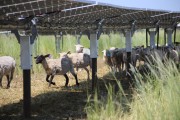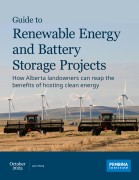
Jason Ruochen Wang is the program manager of the Business Renewables Centre-Canada, an initiative of the Pembina Institute. Before moving to the BRCC, he worked as a senior analyst in the Institute's electricity program, focusing on Canada’s net-zero electricity grid goal, electric vehicle infrastructure, and regulatory reform for utilities. Jason has a degree in mechanical engineering (University of Alberta) and an M.Sc. in Engineering and Policy Analysis (TU Delft) that focused on strategic, "deep uncertainty" thinking and the science-policy interface.
He has previously worked with the Government of Alberta on climate policy analysis, industrial carbon pricing regulations, and adaptation risk management. He has also worked on industrial energy efficiency in a pulp mill, resource governance research with the Potsdam Institute for Climate Impact Research, distributed energy systems modelling at the Centre for Integrated Energy Research in the U.K., and improving decision-making processes in the Dutch Ministry of Foreign Affairs. He previously led the University of Alberta EcoCar team, which builds and races ultra-efficient hydrogen fuel cell vehicles. Jason is also a member of the Canadian Energy Modelling Hub’s Knowledge Exchange, Training, and Policy Impact technical advisory committee.
Jason is based in Edmonton on Treaty 6 territory and can be found biking, skiing or climbing somewhere in the mountains, and promoting active transportation outside of work.
Contact Jason Wang
Jason Wang's Research & Analysis

'Would have saved us months'
Pembina Institute releases new guide to renewable energy, battery storage

New landowner guides to energy development
Our new resources help Albertans navigate the benefits and risks of hosting energy projects – including oil and gas, and renewables – on their land


Guide to Renewable Energy and Battery Storage Projects
How Alberta landowners can reap the benefits of hosting clean energy
New guide offers tips to landowners considering clean energy projects
Guide shortens learning curve for landowners and communities wanting to host wind and solar projects